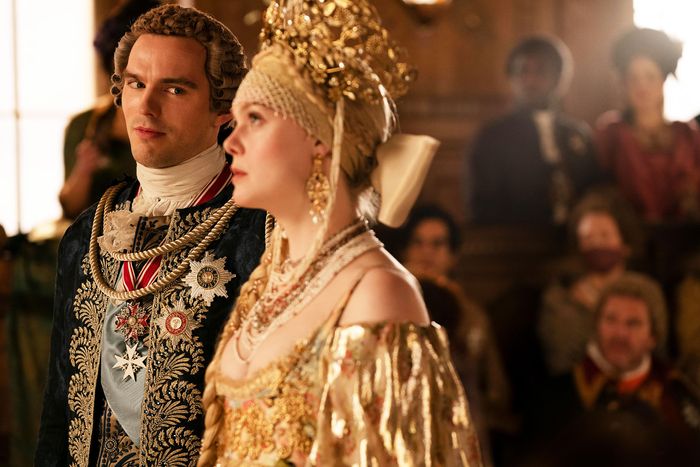
The Great is a show perpetually hanging on a precipice of its own making, although it’s astoundingly good at hiding how hard it works to keep its balance. Even more than in the first season, Hulu’s “occasionally true” drama about the Russian monarch is contained within a fairly small world, with almost all of its action happening inside the palace where Catherine (Elle Fanning) has seized power from her husband Peter (Nicholas Hoult). So it doesn’t feel like a show stretched thin across a sprawling map, and it’s also blessedly free from timeline hopping, currently the most obnoxious trend in streaming drama. Season two is just as lush as the first season, though — the wigs tower high and the only expanses consistently left bare of silk and fur are the bosoms, which heave regularly. There’s excess, excess everywhere, and it’s incredible that something so flowery and deliberately overwrought could also feel almost fragile.
But that is the magic of The Great, a show that jokes and fucks and lops people’s heads off incessantly while simultaneously performing painstaking, subtle emotional calculus. Sometimes it loses its way a little, particularly on the margins. It’s hard for the whole ring of secondary characters to live up to the wild, monstrous, often heartbreaking depiction of the show’s central duo, and it means that occasionally someone like Count Orlo (Sacha Dhawan) or Velementov (Douglas Hodge) has to become palpably mechanical. Their anger or hidden motivations pop out at sudden moments to steer the plot to where it needs to be. On a different show, though, I doubt something like that would even stand out. It’s only because Catherine and Peter are both so finely, minutely drawn. Everyone else is bound to look a little underdeveloped by comparison.
To some extent, that sense that somewhere there are arms windmilling frantically to keep from falling over an edge does bleed into the mood of the show. Season two, debuting in full on November 19, takes place in a weird liminal moment: Catherine has wrested power from Peter, convinced that he’s a violent, amoral nightmare person and that she, Catherine, can be a humane dictator who improves life for everyday Russian citizens. But also, she neglected to kill Peter. And furthermore, she’s pregnant. As a result, all of Catherine’s power is provisional, or ill-defined, or based on facts that are about to shift, or built on a foundation that could crumble in an instant. Peter needles and threatens her, but is also simply flabbergasted by the idea that she might not love him. Does he want to regain her love because it’s a form of power over her? Does he actually have feelings for her? Who can say! (Certainly not Peter or Catherine, who are ill-matched in some ways but are twins in solipsism.)
Catherine spends a good portion of the season pregnant, and it’s one of the most idiosyncratic and tonally effective TV pregnancies in recent memory. The Great is food-obsessed: Every scene is laden with elaborate spreads, and if you were to count up every single line of dialogue Peter has in the show, a significant portion of it would be descriptions of food. But Catherine, pregnant and encouraged to give in to her whims, licks metal and eats dirt. Her advisers put frogs on her belly, and her friends encourage her to have frequent orgasms in order to regulate her bodily humors. Pregnancy and all of its attendant absurdities are an excellent opportunity to lean into The Great’s favorite things: frank depictions of bodies, sex, food, and a looming awareness that something eventful is coming and it might be catastrophic. Catherine lumbers around the palace with a belly that gets larger and larger, and there’s just no getting around the feeling of portending doom. The show is regularly distracted by other things — Catherine’s improvement projects, Peter’s attempts to woo her, the shifting allegiances of all the courtesans and advisers — but Catherine knows that once the baby is born, Peter might kill her. Or she might die in childbirth. Or the baby might be dead. Catherine is a human time bomb.
That feeling of oncoming doom is done so well: present but not too overbearing, and always leavened by the show’s wickedly dark sense of humor. What’s even more impressive is how well season two turns the doom into something poignant and delicate by the end. The Great’s default mode is something close to nihilism, with violence and despair running hand in hand with opulence. Catherine’s wild sincerity, her true optimism that things could actually get better, is often played as a joke. In spite of that, The Great somehow pulls its lead characters into a place of implausible but fully convincing humanity. At the beginning of the season, it’s difficult to imagine taking any of them seriously. By the end, the idea that one of them might betray the other is honestly devastating.
I have no idea whether viewers watch The Great and are frustrated or fascinated by its playful semi-historical mode, or whether they mostly ignore it. Particularly by season two, The Great has to diverge even further from historical record, and sometimes watching the show comes with a faint sense of itchy fingers, reaching for the Wikipedia page just to check. But it’s also grown more confident in its diversions, and as the show’s Catherine and Peter veer further from their historical analogs, they become more themselves. Huzzah.


